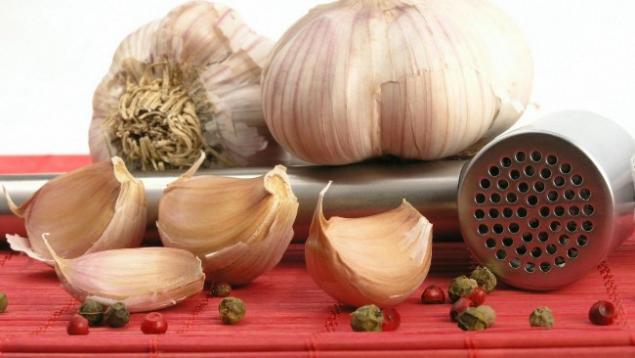637
Garlic — modern science agree with Hippocrates

The ancient Greek scientist Hippocrates, considered the father of medicine, used garlic in treating various ailments. And modern science agree that the garlic has many useful qualities. Today will cover the properties of garlic that have been identified during the research. But in the middle Ages and even much earlier onions and garlic used in cooking and healing.
Dietitian Joe Leech allocates the resource AuthorityNutrition a number of healthy qualities of this popular condiment.
It should be noted that basic information about the benefits of garlic derived from the historical experience of human civilization. In the course of the story, Joe Leach emphasizes that the studies that he cites in his narrative, were very isolated and often carried out on rodents.
Nevertheless, modern science in General agreement with the opinion of the ancients about the fact that garlic is a useful food ingredient. But even with this useful knowledge, in the preparation of your diet should be guided by the recommendations of the doctor, not the information read on the pages of Internet resources. The fact that even the most useful products in some people can cause allergic and other painful reactions.
Garlic contains allicinGarlic belongs to the onion family (Allium), thus a close relative of onions, shallots and leeks. It grows in different parts of the world and is a popular ingredient in cooking. He is appreciated for strong aroma and unique taste. Many ancient civilizations — Egypt, Babylon, Greece, Rome and China used the garlic, and preserved information in the historical sources.
Usually each head of garlic contains 10 to 20 zubochkov. One of the most important components of garlic is the sulphur compound formed during the grinding zubochka. This compound is called allicin and that's what gives garlic odor, which many people do not cause the slightest enthusiasm.
Allicin enters the body through the digestive tract and has a significant bactericidal effect.
Only the chopped garlic!The active component of garlic, allicin is formed only when chopping raw garlic. If you cook the garlic, not crushing, he will not be as beneficial to health. It is best to eat garlic raw. You can also chop or slice it before adding to the dish.
Garlic is very nutritious but not calorieEvery calorie garlic is incredibly nutritious. 28 grams of garlic contains 23% of the recommended daily norm of consumption of manganese, 17% vitamin B6 15% vitamin C, 6% selenium, and 1 gram of fiber. Garlic also contains sufficient quantities of substances such as calcium, copper, potassium, phosphorus, iron and vitamin B1.
In small quantities contained in garlic and other nutrients. It all fits just 42 calories, contains 1.8 grams of protein and 9 grams of carbohydrates.
Garlic fights diseases including the common coldthe Use of garlic in food helps to strengthen the immune system. During the 12-week study revealed that daily consumption of garlic reduced the number of colds by 63% compared to placebo. The average duration of cold symptoms was reduced by 70% in 5 days while receiving placebo to just 1.5 days in the use of garlic.
Another study allowed us to learn that high doses of garlic (2.56 grams per day) can reduce the duration of colds or influenza illness by 61%.
Those people who worried that the introduction in the diet of garlic could help.
Contained in garlic active compounds help to reduce blood pressureHigh blood pressure (hypertension, hypotension) is one of the most significant factors influencing the development of cardiovascular diseases.
Studies have shown that consumption of garlic has a significant effect on reducing blood pressure in people prone to high blood pressure.
But in order for the garlic had this effect, it is necessary to use it in significant quantities. The quantity of allicin needed to provide a similar effect, corresponds to approximately four zubochka of garlic a day.
Garlic helps to regulate cholesterol levels, reducing the risk of heart diseaseGarlic can lower cholesterol (total and LDL) by 10-15%. The LDL cholesterol is considered "bad" and HDL — "good". Garlic lowers LDL-cholesterol, but has no significant effect on HDL-cholesterol.
The garlic has no effect on triglyceride levels, another known risk factor for heart disease.
Garlic contains antioxidants that help prevent Alzheimer's disease and dementiaOxidative effect of free radicals contributes to the aging process. While garlic contains antioxidants that support the body's defense mechanisms opposed to that harm oxidative effect.
Large doses of garlic leads to increased content in the human body enzymes-antioxidants, as well as to a significant reduction in oxidative stress with increased blood pressure.
The combined effect of lower cholesterol and blood pressure, combined with antioxidant properties, may help prevent common brain diseases like Alzheimer's and dementia.
Garlic can increase life expectancyof Mankind is not exactly aware of what determines longevity. But the reduction of risk factors, which include high blood pressure, suggests that garlic can help a person live longer.
His ability to fight infectious diseases is also an important factor, as these diseases are dangerous, especially for older people or people with a weakened immune system.
Garlic helps in sportsGarlic is one of the oldest tools that improve performance. In ancient cultures, it was traditionally used to reduce fatigue and increase productivity.
It was used of Greek athletes-Olympians. Studies conducted in rodents show that garlic helps to improve the performance in the exercises, but exactly to say about his influence in this respect on a person is difficult because studies were few.
In people with heart disease that took garlic oil for 6 weeks, marked reduction in peak heart rate by 12% and reported a higher ability to do exercise.
But the performance of cyclists-athletes garlic is not increased. At the same time, other studies show that the called exercise fatigue is reduced thanks to the garlic.
Garlic helps to detoxify heavy metals in the bodyWhen eating garlic in large quantities, contained sulfur compounds to protect organs from damage from toxic properties of heavy metals.
The four-week study among factory workers producing car batteries (for this production is the excessive lead content), showed that garlic reduced lead levels in the blood by 19%. It also reduced many clinical signs of poisoning such as headaches and blood pressure.
Garlic heals bonesStudies were conducted on rodents and found that garlic reduces osteoporosis by increasing estrogen levels in females.
In one study, women in menopause who consumed daily dried garlic (equivalent to two grams of raw garlic) significantly decreased the deficit of estrogen.
This suggests that garlic has a positive effect on bone health in women. Eating onions and garlic has shown a positive effect in osteoarthritis.
Garlic is affordable and delicious, This advantage does not apply directly to the beneficial influence of garlic on your health, but it is, nevertheless, extremely important. Garlic is very easy to include in the diet and it is a tasty condiment.
It goes well with most savory dishes, soups and sauces. The strong taste of garlic adds spice to many recipes. Garlic is used in several forms which include raw garlic, pasta and powder, as well as garlic oil and garlic extract.
Chopped garlic and mixing it with a small amount of salt and vegetable oil, you can make a wonderful dressing for salads.
The minimum dose of garlic for therapeutic effect, one zubochka with meals two or three times a day.
Garlic is useful not all and not alwayswe should Not forget about the negative qualities of garlic, which in the first place is bad breath. Some people are allergic to garlic.
People suffering from disorders of blood coagulation or taking blood-thinning medications should consult a physician before deciding to increase the amount of garlic in the diet.
Source: hi-news.ru























